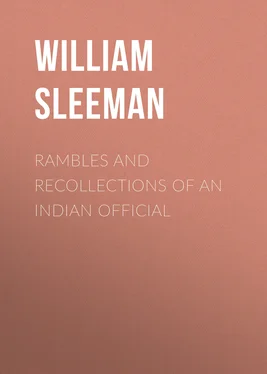William Sleeman - Rambles and Recollections of an Indian Official
Здесь есть возможность читать онлайн «William Sleeman - Rambles and Recollections of an Indian Official» — ознакомительный отрывок электронной книги совершенно бесплатно, а после прочтения отрывка купить полную версию. В некоторых случаях можно слушать аудио, скачать через торрент в формате fb2 и присутствует краткое содержание. Жанр: Путешествия и география, История, foreign_edu, foreign_antique, foreign_prose, на английском языке. Описание произведения, (предисловие) а так же отзывы посетителей доступны на портале библиотеки ЛибКат.
- Название:Rambles and Recollections of an Indian Official
- Автор:
- Жанр:
- Год:неизвестен
- ISBN:нет данных
- Рейтинг книги:4 / 5. Голосов: 1
-
Избранное:Добавить в избранное
- Отзывы:
-
Ваша оценка:
- 80
- 1
- 2
- 3
- 4
- 5
Rambles and Recollections of an Indian Official: краткое содержание, описание и аннотация
Предлагаем к чтению аннотацию, описание, краткое содержание или предисловие (зависит от того, что написал сам автор книги «Rambles and Recollections of an Indian Official»). Если вы не нашли необходимую информацию о книге — напишите в комментариях, мы постараемся отыскать её.
Rambles and Recollections of an Indian Official — читать онлайн ознакомительный отрывок
Ниже представлен текст книги, разбитый по страницам. Система сохранения места последней прочитанной страницы, позволяет с удобством читать онлайн бесплатно книгу «Rambles and Recollections of an Indian Official», без необходимости каждый раз заново искать на чём Вы остановились. Поставьте закладку, и сможете в любой момент перейти на страницу, на которой закончили чтение.
Интервал:
Закладка:
The following lines of Walter Scott, in his Rokeby , have always struck me as very beautiful:-
As yet the conscious pride of art
Had steel'd him in his treacherous part;
A powerful spring of force unguessed
That hath each gentler mood suppressed,
And reigned in many a human breast;
From his that plans the rude campaign,
To his that wastes the woodland reign, &c. 235
Among the people of India it is very different. Children do not learn to exercise their powers either in discovering and robbing the nests of birds, or in knocking them down with stones and staves; and, as they grow up, they hardly ever think of hunting or shooting for mere amusement. It is with them a matter of business; the animal they cannot eat they seldom think of molesting.
Some officers were one day pursuing a jackal, with a pack of dogs, through my grounds. The animal passed close to one of my guard, who cut him in two with his sword, and held up the reeking blade in triumph to the indignant cavalcade; who, when they came up, were ready to eat him alive. 'What have I done', said the poor man, 'to offend you?' 'Have you not killed the jackal?' shouted the whipper- in, in a fury.
'Of course I have; but were you not all trying to kill him?' replied the poor man. He thought their only object had been to kill the jackal, as they would have killed a serpent, merely because he was a mischievous and noisy beast.
The European traveller in India is often in doubt whether the peacocks, partridges, and ducks, which he finds round populous villages, are tame or wild, till he asks some of the villagers themselves, so assured of safety do these creatures become, and so willing to take advantage of it for the food they find in the suburbs. They very soon find the difference, however, between the white-faced visitor and the dark-faced inhabitants. There is a fine date-tree overhanging a kind of school at the end of one of the streets in the town of Jubbulpore, quite covered with the nests of the bayā birds; and they are seen, every day and all day, fluttering and chirping about there in scores, while the noisy children at their play fill the street below, almost within arm's length of them. I have often thought that such a tree so peopled at the door of a school in England might work a great revolution in the early habits and propensities of the youth educated in it. The European traveller is often amused to see the pariah dog 236squatted close in front of the traveller during the whole time he is occupied in cooking and eating his dinner, under a tree by the roadside, assured that he shall have at least a part of the last cake thrown to him by the stranger, instead of a stick or a stone. The stranger regards him with complacency, as one that reposes a quiet confidence in his charitable disposition, and flings towards him the whole or part of his last cake, as if his meal had put him in the best possible humour with him and all the world.
CHAPTER 19
At Sayyidpur 237we encamped in a pretty little mango grove, and here I had a visit from my old friend Jānkī Sewak, the high priest of the great temple that projects into the Sāgar lake, and is called Bindrāban. 238He has two villages rent free, worth a thousand rupees a year; collects something more through his numerous disciples, who wander over the country; and spends the whole in feeding all the members of his fraternity (Bairāgīs), devotees of Vishnu, as they pass his temple in their pilgrimages. Every one who comes is considered entitled to a good meal and a night's lodging; and he has to feed and lodge about a hundred a day. He is a man of very pleasing manners and gentle disposition, and everybody likes him. He was on his return from the town of Ludhaura, 239where he had been, at the invitation of the Rājā of Orchhā, to assist at the celebration of the marriage of Sālagrām with the Tulasī, 240which there takes place every year under the auspices and at the expense of the Rājā, who must be present. 'Sālagrāms' 241are rounded pebbles which contain the impressions of ammonites, and are washed down into the plains of India by the rivers from the limestone rocks in which these shells are imbedded in the mountains of the Himalaya. 242The Spiti valley 243contains an immense deposit of fossil ammonites and belemnites 244in limestone rocks, now elevated above sixteen thousand feet above the level of the sea; and from such beds as these are brought down the fragments, which, when rounded in their course, the poor Hindoo takes for representatives of Vishnu, the preserving god of the Hindoo triad. The Sālagrām is the only stone idol among the Hindoos that is essentially sacred , and entitled to divine honours without the ceremonies of consecration. 245It is everywhere held most sacred. During the war against Nepāl, 246Captain B–, who commanded a reconnoitring party from the division in which I served, one day brought back to camp some four or five Sālagrāms, which he had found at the hut of some priest within the enemy's frontier. He called for a large stone and hammer, and proceeded to examine them. The Hindoos were all in a dreadful state of consternation, and expected to see the earth open and swallow up the whole camp, while he sat calmly cracking their gods with his hammer, as he would have cracked so many walnuts. The Tulasī is a small sacred shrub ( Ocymum sanctum ), which is a metamorphosis of Sītā, the wife of Rāma, the seventh incarnation of Vishnu.
This little pebble is every year married to this little shrub ; and the high priest told me that on the present occasion the procession consisted of eight elephants, twelve hundred camels, four thousand horses, all mounted and elegantly caparisoned. On the leading elephant of this cortège , and the most sumptuously decorated, was carried the pebble god , who was taken to pay his bridal visit (barāt) to the little shrub goddess . All the ceremonies of a regular marriage are gone through; and, when completed, the bride and bridegroom are left to repose together in the temple of Ludhaura 247till the next season. 'Above a hundred thousand people', the priest said, 'were present at the ceremony this year at the Rājā's invitation, and feasted upon his bounty.' 248
The old man and I got into a conversation upon the characters of different governments, and their effects upon the people; and he said that bad governments would sooner or later be always put down by the deity; and quoted this verse, which I took down with my pencil:
Tulasī, gharīb na sātāe,
Burī gharīb kī hai;
Marī khāl ke phūnk se
Lohā bhasm ho jāe.
'Oh, Rājā Tulasī! oppress not the poor; for the groans of the wretched bring retribution from heaven. The contemptible skin (in the smith's bellows) in time melts away the hardest iron.' 249
On leaving our tents in the morning, we found the ground all round white with hoar frost, as we had found it for several mornings before; 250and a little canary bird, one of the two which travelled in my wife's palankeen, having, by the carelessness of the servants been put upon the top without any covering to the cage, was killed by the cold, to her great affliction. All attempts to restore it to life by the warmth of her bosom were fruitless.
On the 7th 251we came nine miles to Bamhaurī over a soil still basaltic, though less rich, reposing upon syenite, which frequently rises and protrudes its head above the surface, which is partially and badly cultivated, and scantily peopled. The silent signs of bad government could not be more manifest. All the extensive plains, covered with fine long grass, which is rotting in the ground from want of domestic cattle or distant markets. Here, as in every other part of Central India, the people have a great variety of good spontaneous, but few cultivated, grasses. They understand the character and qualities of these grasses extremely well. They find some thrive best in dry, and some in wet seasons; and that of inferior quality is often prized most because it thrives best when other kinds cannot thrive at all, from an excess or a deficiency of rain. When cut green they all make good hay, and have the common denomination of 'sahīa'. The finest of these grasses are two which are generally found growing spontaneously together, and are often cultivated together-'kēl' and 'musēl'; the third 'parwana'; fourth 'bhawār', or 'gūniār'; fifth 'sainā'. 252
Читать дальшеИнтервал:
Закладка:
Похожие книги на «Rambles and Recollections of an Indian Official»
Представляем Вашему вниманию похожие книги на «Rambles and Recollections of an Indian Official» списком для выбора. Мы отобрали схожую по названию и смыслу литературу в надежде предоставить читателям больше вариантов отыскать новые, интересные, ещё непрочитанные произведения.
Обсуждение, отзывы о книге «Rambles and Recollections of an Indian Official» и просто собственные мнения читателей. Оставьте ваши комментарии, напишите, что Вы думаете о произведении, его смысле или главных героях. Укажите что конкретно понравилось, а что нет, и почему Вы так считаете.












